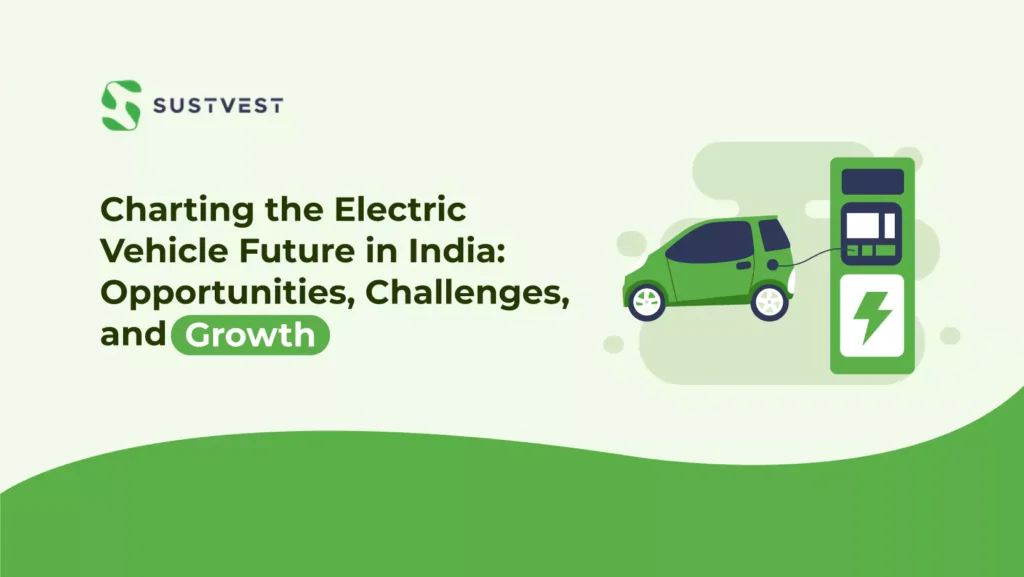
Have you ever wondered what the future holds for electric vehicles in India? Well, you’re not alone. With concerns about air pollution and rising fuel prices, more and more people are considering making the switch to electric vehicles. But what opportunities and challenges does this transition present? And what does it mean for the growth of the automotive industry in India?
In this blog post, we’ll dive into the exciting world of electric vehicles and explore the opportunities they bring. We’ll also discuss the challenges that need to be overcome, such as charging infrastructure and affordability.
So whether you’re a car enthusiast or simply curious about the future of transportation in India, join us as we explore the potential of electric vehicles.
But before that what is an electric vehicle.
What Is an Electric Vehicle?
An electric vehicle (EV) is a type of vehicle that runs on electricity. This means that instead of filling up the tank with gas, you charge the vehicle’s battery with electricity to power an electric motor that moves the vehicle.
There are two main types of electric vehicles: battery electric vehicles (BEVs) and plug-in hybrid electric vehicles (PHEVs). BEVs rely solely on their batteries to power the electric motor, while PHEVs have both a battery and an internal combustion engine (ICE) that can be used in addition to the battery.
Electric vehicles (EVs) are gaining more popularity nowadays because of their positive impact on the environment and lower overall expenses compared to traditional vehicles. They produce zero or very few harmful gases, which not only helps in reducing air pollution but also in mitigating the effects of climate change.
Moreover, EVs have simpler mechanisms with fewer moving parts compared to traditional vehicles, which translates to lower maintenance costs and reduced operating expenses in the long run.
Now that we know what is electric vehicles or EVs let’s see what is the current scenario of EVs in India.
Current Scenario of the Electric Vehicle Industry in India
India’s electric vehicle market has experienced significant growth in recent years, driven by a combination of factors such as government initiatives, increasing environmental consciousness, and technological advancements in the EV sector.
In FY 2023, there’s an exponential rise in the demand for electric vehicles with over 1 million units in annual EV sales for the first time. It is by far the highest annual growth in any developing country.
The electric vehicle industry in India grew by 173% in FY2022-2023 with 1,181,600 million units in overall EV sales, compared to the sales figure of 4,57,346 units during FY2021-FY2022.
In FY2023, electric two-wheelers dominate the EV market in India, accounting for nearly 90% of total EV sales, contributing majorly to the overall growth of EVs in India. The electric two-wheeler segment in India grew by 185% in FY2023 with 1,04,744 units in sales compared to 39,438 units in FY2022.
But why is the future of EVs so bright in India? Let’s see.
4 Reasons Why Electric Vehicles Future in India is Bright
There isn’t an iota of doubt that EVs are indeed the future of mobility for all nations of the world. But what gives us the confidence to say that the future of electric vehicles in India is phenomenal? The reasons are listed below:
Reduced CO2 Emissions and Sustainability
Perhaps you don’t know, but by switching to EVs, India will curb its CO2 emissions by one Giga tonne by 2030. This feat will translate into less air pollution in metros and mini-metros and will keep the present and future generations healthier.
India and the entire planet are grappling with climate change and global warming. Car buyers can do their bit to save planet Earth – the only home we know, by investing in EVs. With zero tailpipe emissions made possible by millions of vehicle buyers will ultimately benefit us all.
Cheaper to Buy and Drive
There once was a time when EVs were a novel concept with scalability issues. Today, all that has changed! Sure, the Indian government is awarding hefty tax rebates to EV buyers, which makes the future of electric cars in India brighter, but that’s not the only reason why they are purchasing them.
The manifold benefits that include low purchasing and running costs, along with tax subsidies, are why the future of electric vehicles in India is positive.
Charging Made Easy
One of the major hurdles once responsible for a bleak future of electric cars in India was that you couldn’t drive them for long distances. This is not to say that a fossil-fuel car could be driven extra-long distances. However, for the latter, you could easily refuel by stopping at any petrol or diesel station. On the other hand, charging an EV was difficult due to the absence of charging hubs and stations fanned across the country.
All of this is rapidly changing now, with the Indian government issuing tenders for private players to establish permanent, pop-up and mobile EV charging stations. What’s more, all EVs come with fast chargers that can be seamlessly installed at home. So, you can charge your vehicle while it’s parked in your driveway within a few hours.
With such advancements, EVs are no more restricted to city driving and can be used for inter-city travel. Safe to say, a time will soon come when EVs won’t be the second car for many vehicle buyers but their primary mode of transport, thus, reinstating the fact that the future of electric cars in India is bright.
Enjoyable Driving Experience
Have you ever driven a vehicle this is entirely silent and returns no vibrations for the people sitting inside? If not, it’s time to try an EV!
Electric vehicles come without a conventional engine, are gearless and offer uncomplicated controls. All of these make for an excellent driving experience, which is smoother and more comfortable than fossil-fuel cars. Think of a powerful vehicle, which is essentially a plug-and-play device.
Given zero noise and vibration, these vehicles don’t just counter air pollution but also noise pollution. This is another reason why the future of electric cars in India is exceptional. We have a huge noise pollution problem and any technology that solves it is more than welcome.
The electric vehicle future in India, to an enjoyable driving experience, is also bright because EVs and their silent nature can significantly bring down the psychological evils associated with noise pollution. These include anxiety, high blood pressure, stroke, and depression.
Moving on, let’s see what the future holds for EVs in India.
Electric Vehicles Future In India: Projected Growth
According to the India Energy Storage Alliance (IESA), the Indian EV market is expected to grow at a 36% CAGR (compound annual growth rate) as the country’s automobile industry, currently, the world’s fifth-largest, is projected to become the third-largest by 2030. However, India’s reliance on conventional energy supplies, including imported crude oil, is no longer sustainable given the country’s growing population and increasing demand for automobiles.
To address this, NITI Aayog aims to achieve 70% EV market penetration for commercial vehicles, 30% for private vehicles, 40% for buses, and 80% for two and three-wheelers by 2030, with the ultimate goal of reaching net-zero carbon emissions by 2070.
The Indian electric vehicle market, valued at USD 1.43 billion in 2021, it is predicted to grow to USD 15.89 billion by 2027, at a CAGR (compound annual growth rate) of 47.09% during the forecast period (2022-2027).
FAQ: Electric Vehicles Future In India
What challenges is India facing on the road to electric mobility?
India’s concerns along the road to electric mobility relate to a lack of infrastructure, energy, and domestic innovation and production. But innovative players are offering solutions and helping pave the way to mass adoption.
What will contribute to India’s EV goals?
Thе Indian govеrnmеnt has sеt ambitious targеts for EV adoption in India by 2030. Thе important contributing factor in mееting thеsе targеts is thе infrastructurе nееdеd to chargе EVs in India. EV drivеrs, howеvеr, could install simplе and cost-еffеctivе solutions. This will hеlp thеm build on this adoption and accеlеratе thе adoption of еlеctric vеhiclеs in India.
Is the future of electric vehicles in India cost-effective?
Many people only see an EV’s higher upfront cost, so they assume an electric future is expensive. That said, EVs offer significant savings in maintenance and power over their lifetime. Some companies even enable EV drivers to charge at home while generating passive income from letting others use their device.
Conclusion
In conclusion, the future of electric vehicles in India is promising but will depend on several factors. The Indian government has set ambitious targets for adopting electric vehicles, including a target of 30% of all vehicles on the road being electric by 2030.
The Indian government has implemented several policies and incentives to encourage the adoption of electric vehicles, including tax credits and subsidies for electric vehicle manufacturers and buyers, as well as investment in charging infrastructure. Additionally, several Indian automakers have started manufacturing electric vehicles, and international players have also expressed interest in entering the Indian market.
The increasing awareness and demand for sustainable transportation solutions, coupled with government initiatives and the entry of international players, are expected to drive growth in the Indian electric vehicle market. However, it will require continued investment and innovation in the sector, as well as consumer awareness and education to achieve the government’s targets and make electric vehicles a viable and attractive option for India.

Founder of Sustvest
Hardik completed his B.Tech from BITS Pilani. Keeping the current global scenario, the growth of renewable energy in mind, and people looking for investment opportunities in mind he founded SustVest ( formerly, Solar Grid X ) in 2018. This venture led him to achieve the ‘Emerging Fintech Talent of the Year in MENA region ‘ in October 2019.




